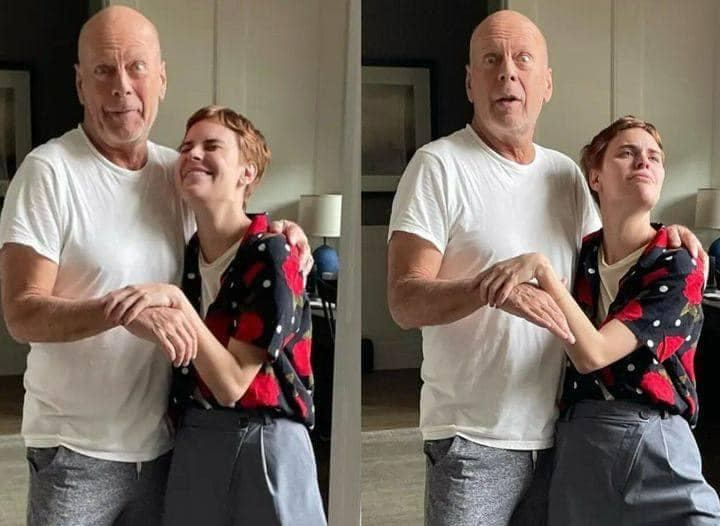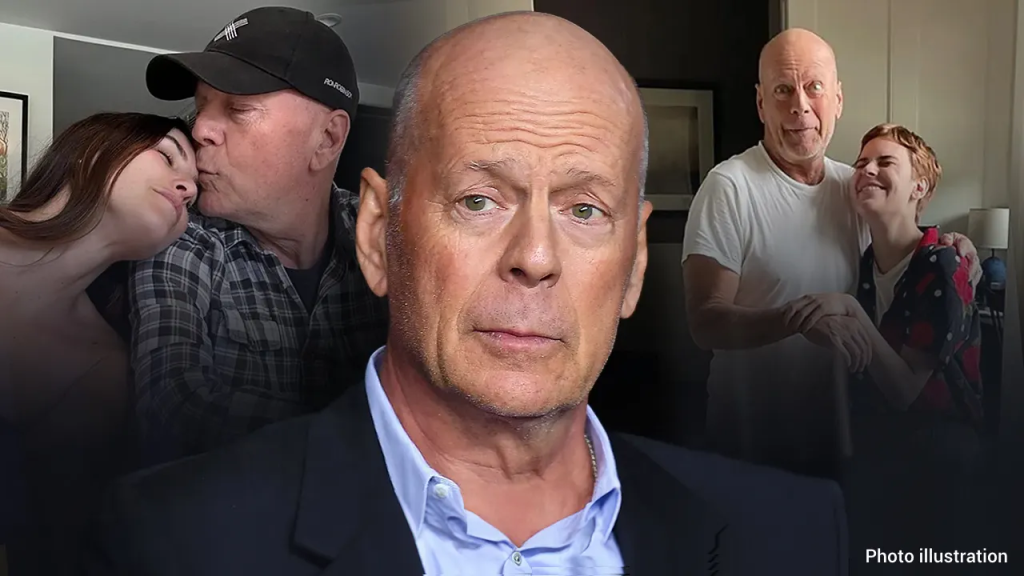The world has always known Bruce Willis as a voice of charisma—whether it was John McClane’s unforgettable one-liners in Die Hard or the quiet intensity of The Sixth Sense. But today, fans are grappling with the painful reality that the man who built a career on words, wit, and presence is losing his ability to communicate verbally. Diagnosed with frontotemporal dementia (FTD), Willis now faces one of the cruelest neurological conditions, a disease that strips away language and personality while leaving loved ones clinging to the essence of the man they adore.

Bruce Willis’ Journey With Frontotemporal Dementia
Frontotemporal dementia, often overshadowed by Alzheimer’s in public awareness, is devastating in its own right. Unlike memory-first decline, FTD attacks the parts of the brain that control communication, social behavior, and emotional expression. For someone like Willis—whose career thrived on sharp dialogue and charm—the impact feels especially cruel.
When Willis’ family announced the diagnosis, the outpouring of love was immediate. Fans, colleagues, and friends shared their memories and tributes, reflecting not just on his career but on the warmth and humor he carried behind the camera.
Video: Bruce Willis is seriously ill and can no longer speak.
Glenn Gordon Caron’s Emotional Update
Recently, Glenn Gordon Caron, the creator of Moonlighting—the TV show that first launched Willis into stardom—shared a bittersweet update. “He’s not totally verbal,” Caron explained, noting how the actor who once devoured books and words can no longer enjoy reading. “All those language skills are no longer available to him, and yet he’s still Bruce.”
The comment struck a chord. Even stripped of verbal abilities, Willis still radiates the same presence that made him so beloved. Caron added that while his joie de vivre has faded, there remains a spark—a reminder that the man is still there, even if words no longer carry his essence.
The Toll of FTD on Communication and Connection
The tragedy of FTD lies in its assault on identity. Conversations fade, social connections become strained, and personality traits can alter. For families, this means learning to communicate in new ways—through gestures, expressions, and shared silence.
For Bruce Willis, whose career was built on timing, expression, and dialogue, the diagnosis feels like an attack on his very artistry. Yet, his family emphasizes that his humanity and warmth still shine through. He still recognizes loved ones, still connects through presence, and still embodies the man they know.
The Strength of Family Support

Through the decline, Bruce has not walked this path alone. His wife, Emma Heming Willis, has been a steadfast partner, balancing care with advocacy for dementia awareness. His daughters, too, have surrounded him with love, often sharing glimpses of family life with fans.
What’s most moving is how they have shifted the narrative from loss to gratitude—focusing on the moments of connection they still have, instead of solely mourning what has been taken. This perspective reflects resilience, love, and an understanding that legacy isn’t just about the past, but also about how we choose to live in the present.
Fans Around the World Send Love
Bruce Willis has always been more than an action star. His roles have ranged from tough guys with a heart to vulnerable characters grappling with humanity. That versatility, paired with his natural humor, made him relatable across generations.
Video: Bruce Willis continues to inspire us all with his strength and love on his 69 birthda
Now, fans globally continue to send messages of strength, creating an invisible network of support for a man who gave decades of storytelling to audiences. His work continues to inspire, reminding us that even if his voice has grown quiet, his impact is still loud and clear.
A Legacy That Words Cannot Define
Even without verbal communication, Willis’ legacy transcends dialogue. His films remain cultural touchstones, his career proof that charisma is more than words, and his family’s devotion evidence that love speaks louder than language.
The loss of speech does not erase identity—it reshapes how we understand it. And in Bruce Willis’ case, his essence, humor, and humanity are still deeply present.
Conclusion: Still Bruce, Always Bruce

Bruce Willis may no longer communicate the way fans remember, but those closest to him insist he is still the man they love. His diagnosis is a sobering reminder of life’s fragility, but also a testament to resilience, family, and the power of presence.
Even in silence, Bruce Willis remains a storyteller. His legacy is carried not just in scripts or dialogue, but in
the lives he touched, the family that surrounds him, and the enduring spirit that makes him, simply, Bruce.


